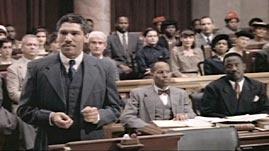Movie Info
Movie Info
- Director
- Helaine Head
- Run Time
- 2 hours
- Rating
- Not Rated
VP Content Ratings
- Violence
- 1/10
- Language
- 1/10
- Sex & Nudity
- 0/10
- Star Rating
Relevant Quotes
Give justice to the weak and the orphan;
maintain the right of the lowly and the destitute.
Rescue the weak and the needy;
deliver them from the hand of the wicked.”
…and you shall proclaim liberty throughout the land to all its inhabitants. It shall be a Jubilee for you: you shall return, every one of you, to your property and every one of you to your family.

This docudrama from the PBS series American Experience is a wonderful history lesson filling in the details of the Supreme Court’s decision that knocked down the “separate but equal” decision that had permitted the segregation of American schools ever since the 1890s. This was thanks to the hard work of NAACP lawyers Charles Hamilton Houston (James Avery) and Thurgood Marshall (Peter Francis James). Everyone remembers Marshall who became the first Black member of the Supreme Court, but the memory of Houston has faded, so this is a good film to revive his reputation. As we see in this film, he was crucial in the education and mentoring of Marshall. The film is based on the book by Richard Kluger, Simple Justice: The History of Brown v. Board of Education and Black America’s Struggle for Equality, first published in 1975.
The date of May 17, 1954 is remembered and celebrated as a turning point in American history when the Supreme Court ruled in Brown v. Board of Education that segregated schools were unconstitutional. What is little known is the years of diligent work, dating back to Thurgood Marshall’s law school days and the professor who trained him, Charles Houston. Thus, the film begins at Howard University Law School where Marshall enrolled after being rejected by the University of Maryland Law School. At Howard he and his classmates are under the stern tutelage of Professor Houston, who makes it clear time after time that he is not interested in teaching men to become lawyers seeking their own gain. He wants men who will become staunch advocates for the freedom of their people.
By the time Marshall graduates, his mentor has been lured by NAACP Executive Walter White (Terence Alexander) to become head of the staff of the NAACP Legal Defense and Educational Fund, and Houston recruits him as his assistant. Together in 1935 they sue the very school that had rejected him, the University of Maryland Law School. (I love the irony of this!) The team wins various victories, but always the Supreme Court’s decision in the 1896 case, Plessy v Ferguson, hangs over them. They are reluctant to challenge that the established doctrine of “separate but equal.”
Psychologist Dr. Kenneth Clark (Giancarlo Esposito) is brought in, his famous experiments with children proving persuasive to the lawyers’ contention that separate is inherently unequal. Besides scenes involving Dr. Clark and the NAACP team, there are numerous scenes showing the Supreme Court justices wrestling with the testimony of Dr. Clark and legal theory. These justices include Supreme Court –Chief Justice Vinson (Roy Lind), Felix Frankfurter (Sam Gray), William O. Douglas (Tom Stechschulte), Robert Jackson (Charls McLawhorn), and after the death of Justice Vinson, Chief Justice Earl Warren (Pat Hingle). I don’t know what the source(s) of their discussions, or if this is conjectural, but it makes for riveting viewing.
This is another film that informs as well as entertains us. The former also involves historians adding their comments to the dramatic re-enactments. Although the Supreme Court gutted the 1965 Voting Rights Act, this film reminds us that there was a moment—and thus far that word applies—when the Court rose above its long history of racist opinions to “proclaim liberty throughout the land to all its inhabitants.” Do watch this inspiring film because it helps us to believe in and strive for a society “with liberty and justice for all.”
Note: There is an excellent article on The Dolls Test providing more information about Dr. Clark, and even has a link that will take you to our movie.
This review is in the Nov. issue of VP along with a set of questions for reflection and/or discussion. If you have found reviews on this site helpful, please consider purchasing a subscription or individual issue in The Store.
